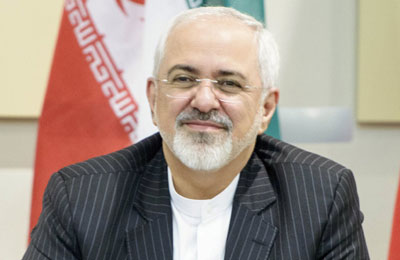
Iran, world powers ‘closer than ever to nuke deal’
UNITED NATIONS, April 28, 2015
The US and five other major powers are closer than ever to a deal with Iran that would end a 12-year-old standoff over Tehran's nuclear program, though more tough negotiations lie ahead, US Secretary of State John Kerry said on Monday.
Kerry spoke at the United Nations on the opening day of a month-long conference taking stock of the 1970 nuclear Non-Proliferation Treaty and ahead of a meeting in New York with Iranian Foreign Minister Mohammad Javad Zarif, their first face-to-face encounter since recent marathon talks in Lausanne, Switzerland.
Zarif and Kerry met later on Monday at the Iranian U.N. ambassador's residence across from Central Park and discussed efforts to secure a final agreement between Iran and the six powers by a June 30 deadline.
The meeting was "productive," a senior US State Department official said, speaking on condition of anonymity. "They discussed the work that political directors and experts did last week in Vienna and the path forward for the talks," the official added.
Kerry told the 191 NPT parties: "We are, in fact, closer than ever to the good, comprehensive deal that we have been seeking, and if we can get there, the entire world will be safer." He said bringing Iran back into compliance with the pact was always at the heart of negotiations with Tehran.
"If finalized and implemented, (an agreement) will close off all of Iran's possible pathways to the nuclear material required for a nuclear weapon and give the international community the confidence that it needs to know that Iran's nuclear program is indeed exclusively peaceful," he said.
Kerry added, however, that "the hard work is far from over and some key issues remain unresolved."
In remarks to Iranian state television upon his arrival in New York, Zarif echoed the concerns about unresolved issues in the talks with the United States, Britain, France, Germany, Russia and China.
"Beside taking part in the conference, we have come here to listen to Americans' explanations on the US administration's undertakings and its domestic policies," Zarif said.
"We consider the US government responsible for fulfilling its international commitments under international laws," he said. "No government can evade such commitments because of its domestic issues."
Zarif appeared to be referring to US Republican senators' pledge to try to toughen a bill giving Congress the power to review a nuclear agreement with Iran, a move that could further complicate the talks.
IRAN CRITICIZES NUCLEAR ARMED STATES
In a tentative deal reached between Iran and the six powers earlier this month in Lausanne, Tehran - which denies seeking nuclear weapons - agreed to curb sensitive nuclear work for at least a decade in exchange for ending sanctions that have crippled its economy.
Diplomats need to iron out details about the timing of sanctions relief, the future of Iran's atomic research and development program, the exact nature of International Atomic Energy Agency monitoring, and what kind of uranium stockpiles Tehran will be allowed to keep under any final accord.
Another issue that remains unresolved is Iran's past nuclear work that could have been related to weapons research. IAEA chief Yukiya Amano reiterated that he still could not confirm that Tehran's nuclear activities are entirely peaceful.
Amano also expressed hope that Iran would sign on to a more intrusive IAEA inspection regime called the "Additional Protocol," which the agency created after revelations about Iraq's clandestine atom bomb program in the 1990s.
"Implementation by Iran of the additional protocol would enable the agency to provide credible assurance about the absence of undeclared nuclear material and activities in the country," Amano said.
After the latest round ended without a breakthrough last week in Vienna, Iran and the six powers are expected to resume talks soon.
Sanctions are proving to be a key hurdle. Iran's Supreme Leader Ayatollah Ali Khamenei has said all sanctions, including the most severe restrictions on the energy and financial sectors, should be lifted the moment a deal is signed. But Western officials say this is not what Tehran agreed to in Lausanne.
At the NPT meeting earlier on Monday, Zarif spoke on behalf of the 120-nation Non-Aligned Movement. He demanded the five nuclear weapon states scrap any plans to modernize or extend the life of their atomic arsenals, while branding Israel a threat to the region due to its presumed nuclear stockpile.
"We call upon the nuclear-weapon states to immediately cease their plans to further invest in modernizing and extending the life span of their nuclear weapons and related facilities," Zarif said.
Israel, which neither admits nor denies having atomic weapons, is not an NPT signatory. An Israeli official dismissed the Iranian criticism.
Kerry spoke of Washington's "unequivocal" commitment to disarmament, though he admitted that more needed to be done by the United States and Russia.
"Despite significant reductions, the United States and Russia still possess more than 90 per cent of the world's nuclear weapons," Kerry said.
He also said that the United States would accelerate the dismantling of thousands of retired nuclear warheads by 20 per cent, and urged Moscow to take up a US proposal of further reducing nuclear weapons permitted under the new START treaty by an additional third. – Reuters







